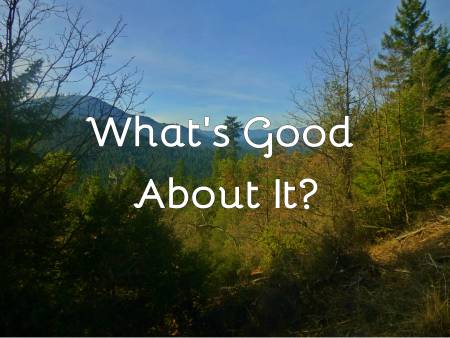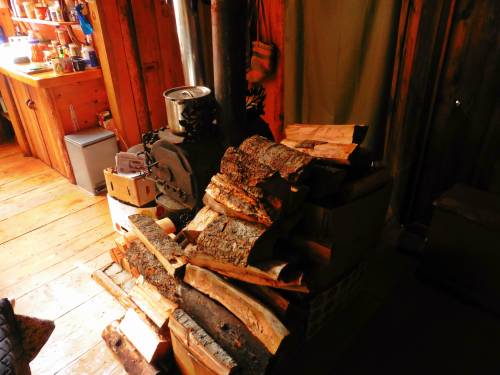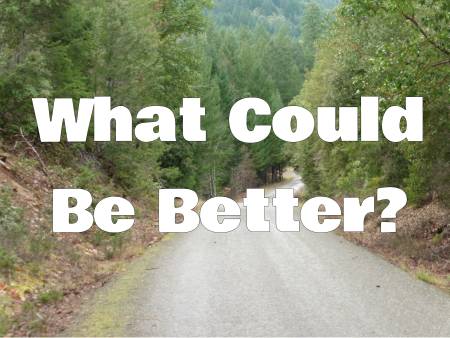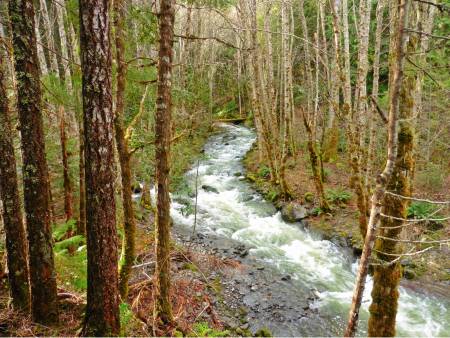For the last six weeks I’ve been living in a log cabin in the south of Oregon. It’s beautiful, tranquil, fairly remote, and you don’t need any connection to the outside world in order to sustain yourself. (Although I’m not Davey Crockett yet……there are still weekly trips to Costco).
The electricity comes from two solar panels in the front yard, and the water comes from a creek right next door that’s drawn in from a gravity pump. Heat’s made the old fashioned way: by chopping firewood and putting it into a wood stove.
I don’t hunt squirrels or skin bears for my loin cloth, but there are various gardens on premise where a lot of your own food can be grown.
The reasons for coming here were two-fold:
1). A personal sojourn to experience a new way of life, or something like that.
2). Allow myself to save money for ingredients in my next product. Methylfolate doesn’t pay for itself.
It’s been an interesting stay, especially for a lifelong city boy like myself. The lack of lifestyle signals makes it both refreshing and dull at the same time. I cherish the thought of doing this for three months, but loathe the idea of doing it for a year.
The Good Parts
I’d summarize the biggest benefits of living this way as follows:
- Your need for monetary transactions goes way down. The economy in these parts thrives on barter-exchange, so if you dislike the thrust of commercial culture living like this is a breath of fresh air.
- It’s a great cure for insomnia. You’re confronted with a lot less circadian-disturbing electronic signals and the sky turns pitch black around 7:15. There’s no 7-11 around the corner or hot new club to go to, so going to bed just comes naturally. I’ve never been able to maintain a morning schedule but I go to bed at 8 and wake up at 4 and it feels completely normal.
- Your day-to-day routine has health built into it. This place takes about 5 hours of honest work a day in order to be maintained and a lot of it involves taxing labor. Swinging axes, pushing wheelbarrows, lifting boulders, etc. It’s simple work and it gets boring quickly but it has a nice brisk pace to it and does its part to keep you fit, unlike work elsewhere.
- It keeps your gut colonized. A lot of autoimmune disorders are a by-product of having an over-anxious immune system. We’ve gotten so good at removing parasites that our killer t-cells just roam around inside of us like a bratty teenager looking to stir up trouble. Here you spend a lot of time in the dirt, moving maneur, and just being around nature’s elements in general. It keeps the gut buggies happy.
- It removes a lot of details that most people would love to do away with. The need to keep track of stuff goes way down here. You could actually live without a wallet and cell-phone without being inconvenienced. In fact, I’m about 72.3% certain that the majority of people in this neck of the woods do exactly that, or something close to it. Living disconnectedly allows for a charming amount of unsophistication.
- Life has a sameness to it for pretty much everyone. People who are worried about two-class societies ought to move out of the cities and into the woods. Everyone has a similar lifestyle cadence and net worth doesn’t have an effect on how you go about your day-to-day activities. It’s important to understand that there is not income equality here since this place has lots of millionaire landowners, but rather what you have in the bank doesn’t seem to matter all that much for how you can mingle with everyone else.
- It’s a good sink for obsessive tendencies. Being in the country gives you a sandbox to insulate yourself from impulsiveness and neuroticism. It’s not that it makes it go away, it’s just that you end up channeling it towards things that don’t have an effect on strangers and the lack of intrusive outside influences means there’s no gasoline to pour on the fire.
- There’s a hobbit living in our woods. Crazy, but true. I don’t know his name, but he lives in the middle of the woods and comes out and walks up and down the streets during the day. I wish I had a picture but for now you’ll just have to take my word for it.
So that’s the good stuff.
The Not-So-Good
What gets old? Let me tell ya.
- It gets dull. In the Communist Manifesto Karl Marx noted that industrial life helped save the masses from “The Idiocy of Rural Life.” I see what he’s talking about. It’s very easy to get into a routine that requires very little change of pace or original thought. I’m actually worried that my mind’s been blunted from the time away.
- It’s expensive. A little catchy, right? Or rather, it’s expensive if you want to experience a certain level of comfort while still being off the grid. The place I’m staying at cost a million dollars to make. You could build a simple log cabin with a wood stove and live on very very little, but the moment you want to get into creature comforts then things get complicated. The marginal cost of living on-the-grid is much smaller.
- It’s not stress-free. I imagine a lot of people think living outside of commercial society is tranquil, but it trades one type of stress for another. The big difference is that instead of having a bunch of interactions with a lot of strangers you have a few repetitive ones with the same people over and over. In his memoir the anthropologist Napoleon Chagnon observed that life in Yanomamo villages was very stressful because tensions between people didn’t have a chance to reside and they often persisted for years. I see what he’s talking about. No one’s gotten out their battle axes yet, but differences between people have a way of simmering into something confrontational due to the lack of a safety valve.
The Daily Routine
The daily grind looks something like this:
- Wake up between 4-4:30. I’ll usually work on Health Kismet stuff until about 8:30 or so. This is my biggest block of free time during the day and my major chance to be productive. Whatever’s important that’s going to happen takes place during these hours.
- Breakfast at 9. Various people come into the central cabin to make breakfast together.
- Work begins at 10. There’s usually a brief meeting about what needs to be done that day and then people split into their different ways.
- 12:30-1: Lunch.
- 1:00-3:30: Afternoon work, usually a continuation of whatever happened in the morning.
- 3:30-5: Break.
- 5:00-6: Dinner.
- 6-Bed: Free time. Sometimes a game of Scrabble, other times it’s just work. Maybe reading.
Wash. Rinse. Repeat.
My fuzzy opinion about this sort of thing is that, in the same situation I’m in, about 65% of people would prefer this to what they have now. There’s no upward mobility, but there’s no downward mobility either. If you have trouble treading water and consuming the variety of signals life throws at you, then cabin in the woods is probably a pretty-good tradeoff.
If you thrive on the activity then you’ll probably just want to keep this as a weekend retreat.



Cool man! Sounds fun. Stay warm. Have you had to hunt your own food yet?
LikeLike
Not hunting my own food yet. I don’t think I”m up for that.
LikeLike
Jonathan, where did you find this place? Is it on AirBnB or WWOOF, or is it private?
LikeLike
sounds refreshing. everyone should try it for 1 month per year
LikeLike
David….I would say 1 month per year is about perfect!
LikeLike
I like cabins. They are the square shape and room. Animal to be seen with eyes in window. Sorry for my English
LikeLike
My family loves spending time in nature, so my husband and I have been thinking about getting a log cabin in the mountains for us to vacation in. Before reading this, I had no idea that living in the woods for a while can help your sleeping patterns by not giving you electronic signals to keep you up. It seems like a great way to get out of real life for a while and tune into nature. I’ll be sure to share this information with my husband as we figure out what we want to do.
LikeLike